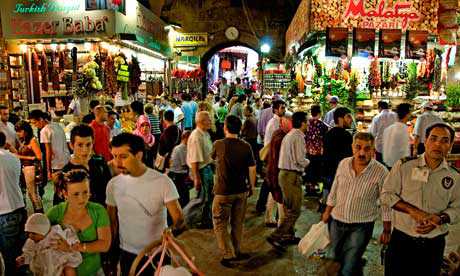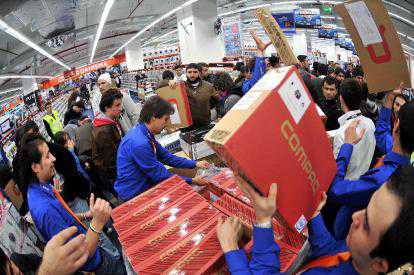Turkey may not be the most obvious export market for British SMEs, but with a large growing economy, it could be worth considering
-
Rosie Niven
- Guardian Professional,

Straddling two continents, Turkey has been an important trading post going back to Roman times and earlier. In 2012, Turkey is the world’s 18th and Europe’s seventh-largest economy. With a population of 73 million, the eastern Mediterranean country has a large pool of potential consumers.
More importantly, Turkey has a growing economy. Its gross domestic product grew by 8.5% in 2011, making it the fastest-growing economy in Europe. It is estimated that Turkey will be in the top 10 GDP economies by 2023. And, with close links with both Europe and Middle Eastern economies, Turkey remains an important staging post for businesses entering Asian markets.
Last month, the UK’s deputy prime minister, Nick Clegg, led a British business delegation to Turkey to discuss possible new deals with their Turkish counterparts. Those who participated included CEOs from companies such as Arup, Mott McDonald and Cella Energy.
A number of British high-street names are already present in Turkey, including Marks & Spencer, Tesco, Vodafone and Laura Ashley. In the past year, Turkish imports of British goods and services rose by 20%, and the government has an ambition of doubling bilateral trade between 2010 and 2015.
But it is not just big businesses that are able to access the opportunities presented by Turkey’s booming economy. More and more SMEs are taking advantage of cheap short-haul flights to tap into markets in Istanbul, Ankara and other major Turkish business hubs.
One of these SMEs is Leicestershire-based Pera Consulting, which signed a contract worth £2m with a Turkish government agency 18 months ago and is now bidding for work that could be worth up to £50m. Among Pera’s services are business advice and management training provided to governments to help increase business productivity, innovation, export and growth. These services are particularly relevant in growing economies like Turkey’s, says Tanya Allen, Pera’s head of marketing and communications. “Turkey offers significant opportunities for us with our experience in designing business growth stimulation programmes.”
Opportunities
Business and management consultancies like Pera are among the SMEs that are finding their sectors in demand. According to UK Trade and Investment (UKTI), other areas of opportunity include energy and renewables, ICT, defence technology, education and skills and infrastructure. The main UK exports to Turkey in 2011 were machinery and mechanical appliances, pharmaceuticals, iron and steel and plastics.
Pravin Jethwa’s company Amazing Interactives produces 3D software for clients in the education sector. Their route into the Turkish market followed a trade fair where they met a number of potential clients from Turkey where there is currently lots of investment in school building. One of the meetings eventually turned into a deal. “They looked at our software and liked it and trialled it in some of their schools in Istanbul,” he said. “That gave us a foothold in Turkey.”
Like many businesses exploring overseas markets, Amazing Interactives accessed support from UKTI in the form of an Overseas Market Introduction Service (OMIS), which identified the markets that had potential for their company and a list of possible clients there.
Amazing Interactives also found that its client and suppliers could provide support. The trust that owned the schools it supplied was able to organise an event in Turkey to showcase the company’s 3D software. Texas Instruments, a company that supplied hardware to Amazing Interactives, also wanted to increase its profile in Turkey through this event and agreed to pay for Jethwa’s flights and accommodation.
Since Amazing Interactives won its first contract in Turkey, its products have been procured by other schools in the same group, and Jethwa says that he has had interest from institutions elsewhere in the country. That poses new challenges for Amazing Interactives, who for the first time are hitting the language barrier. Their previous client, a top school in Istanbul, was happy with the software being in English. “One of the issues now is that potential clients want it in Turkish,” he explains.
Trade missions
Pera dealt directly with a Turkish government agency initially, which provided some support. This agency helped it understand the barriers Turkish businesses were facing and how Pera could help in these areas.
But, as Pera widens its interests in the market, it is making more use of other support. One source of support that Pera has called on is UKTI, which has carried out an OMIS on Turkey for the company. Earlier this year, Pera’s executive chairman John Hill went on one of UKTI’s trade missions to Turkey. “It was highly beneficial in opening doors that would have taken a lot longer to realise otherwise,” says Allen. “For the new ventures we are pursuing, we have identified a local partner to work with, an organisation with a very similar ethos and reputation to ourselves within the business community.”
Allen recommends that other SMEs should consider using the support available from UKTI and find themselves a good local partner with connections throughout the country, not just in Istanbul and Ankara.
“Global competition is fierce, so SMEs must ensure they have the best advice before tackling any market,” says Allen. “Demonstrating a long-term commitment to Turkey and integrating with the local business community and with key intermediaries is absolutely vital,” she advises.
But Allen says that the Turkish market is one that is worth pursuing because “it represents not only a high-growth economy, but one that is at the juncture between Europe, Asia and the Middle East”.
UKTI appears to agree. Forecasts predict that, by 2025, Turkey will be one of the top 10 economies in the world and UKTI has identified it as a priority market, noting that its “recent economic growth record, its talented, young workforce and its geographical location as a prime hub for regional market access make Turkey a hugely attractive destination for UK and European trade and investment”.
But UKTI has also identified how Turkey offers significant untapped potential by British business and has sought to strengthen bilateral ties.
Allen is optimistic that Turkey will go on offering export potential for SMEs. “It’s been a trading post for thousands of years, and that is likely to continue,” she explains. “Turkey has a great future, and it will be a thriving market for years to come.
“It won’t always be easy,” she adds. “But, with the right local support, it’ll certainly be worthwhile.”
This content is brought to you by Guardian Professional. To receive more like this you can become a member of the Small Business Network here.
We’d love to hear your views and thoughts in the comments but please remember not to disclose personal identifiable details.


